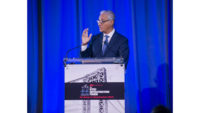58 Big-City Mayors Focus on Reducing Building Energy Use

Globally, buildings are responsible for 8% of greenhouse-gas emissions. In New York City alone, buildings account for 75% of GGEs. In response, mayors and other concerned groups are focusing on making buildings and cities better citizens in regard to climate mitigation. Existing buildings are a big target.
On the global stage, C40 Cities—a collective of 58 large cities that was created in 2005—advances and shares programs and regulations in partnership with former President Bill Clinton's Climate Initiative. "Cities are acting because mayors face the results of climate change," said David Miller, former chairman of C40 and a former mayor of Toronto, at a Feb. 21 forum at New York University on sustainable real estate. Miller is currently a lawyer with Aird & Berlis LLP.
Further, the United Nations Environment Programme has beefed up its partnership with ASHRAE to phase out the use of ozone-depleting substances in refrigeration and air-conditioning applications around the world.
Perhaps the most well-known non-profit tackling green building is the World Green Building Council. The non-profit Urban Land Institute also has building-specific programs, including the ULI Greenprint Center for Building Performance. The center, which lately has experienced explosive growth, is a worldwide alliance of real estate owners, investors, financial institutions and others committed to improving the environmental performance of the global real estate industry.
For many, the first step is to benchmark current energy use. Greenprint provides a digital information platform for its members to measure and track energy, emissions, water and waste performance data.
Each year, more cities require property owners to report energy use. "Data, with appropriate protection for privacy, would greatly aid cities developing energy retrofit programs," said Miller. Toronto has such a reporting program, he added.
Building owners are seeing that energy conservation is good for business. "There isn't any investor or corporate owner today who isn't paying attention to sustainability practices," said Peter Steil, CEO of the National Council of Real Estate Investment Fiduciaries, a data services provider focused on creating performance benchmarks for institutional real estate investors.






